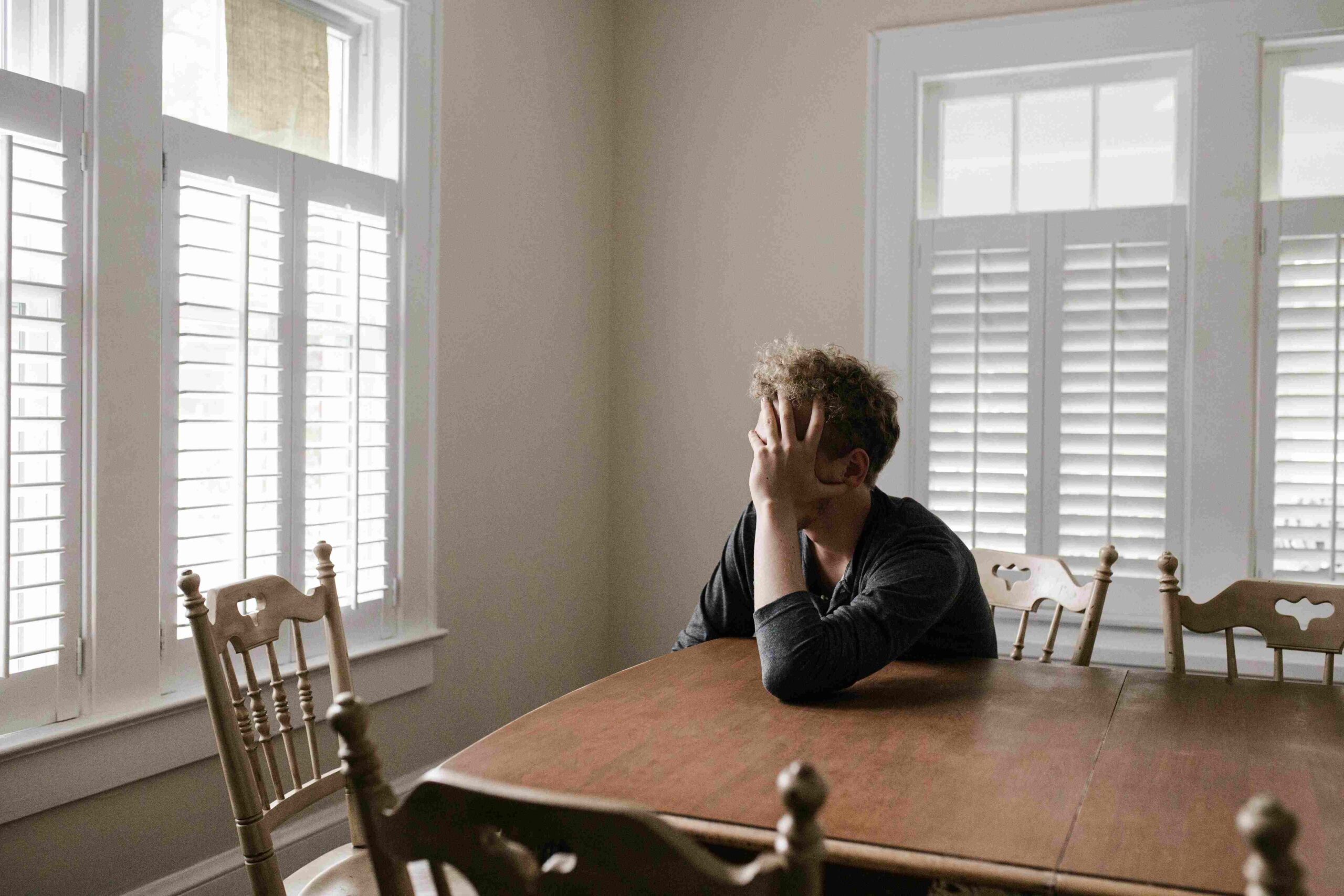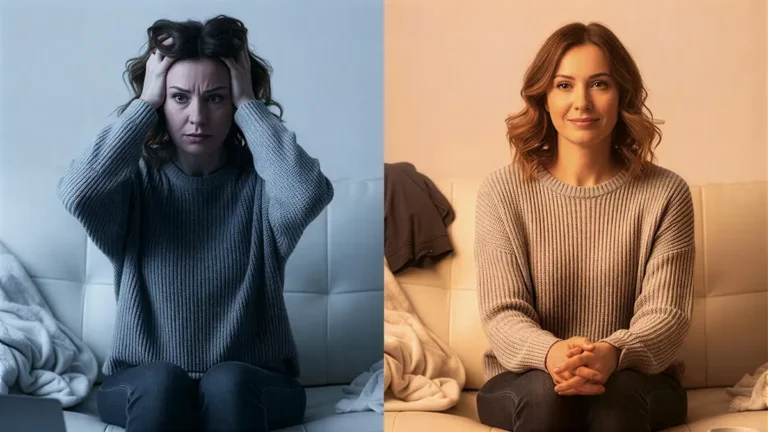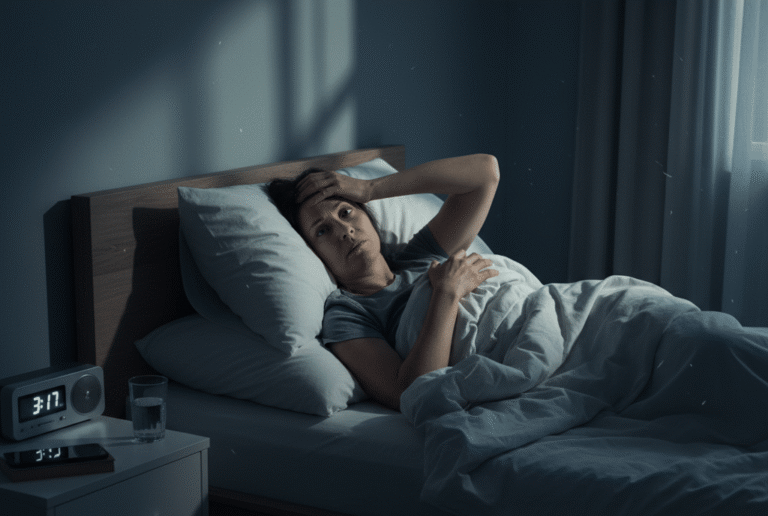9 Strategies to Help Your Anxiety : Understanding Anxiety Symptoms In Your Mind And Body
Anxiety affects millions of adults in the United States alone, but so many people struggle to articulate exactly what it feels like. If you’ve ever found yourself searching for words to describe that overwhelming sense of dread or the physical sensations that seem to come out of nowhere, you’re not alone.
Understanding what anxiety feels like, both mentally and physically, is the first step toward dealing with it. Whether you’re experiencing anxiety yourself or supporting someone who is, this will provide hopefully clarity and insight to help navigate anxiety.
Anxiety: More Than Just Worry
Anxiety is your body’s natural response to stress or perceived danger. While everyone experiences occasional worry or nervousness, anxiety becomes a concern when it is persistent, excessive, or interferes with daily activities.
The whole point of anxiety is to activate your body’s “fight-or-flight” response, which is an evolutionary survival mechanism designed to protect you from threats. When your brain perceives danger (real or imagined), it triggers a load of physiological changes to prepare your body for fight or flight.
The challenge with modern anxiety is that this ancient system often activates in response to non-life-threatening situations. Your body begins to react to a social interaction with the same intensity it would have for escaping the grips of a bear or lion. This issue between perception and reality creates what we now know as anxiety.
Anxiety is a spectrum, it ranges from mild discomfort to debilitating panic. Some people experience anxiety as a constant background hum of worry, while others face intense episodes that peak and subside, like a wave.
How Anxiety Manifests in Your Body
Physical symptoms of anxiety can be surprisingly intense and different for everyone. Many people are unaware of how much anxiety affects their body, and sometimes people will think they have other medical conditions instead. Below are some of the ways anxiety manifests in the body.
Cardiovascular Changes
Our hearts are the first part of our bodies that are affected by anxiety. When anxiety increases, so does you heart rate, sometimes you will notice your heart racing, pounding, or even skipping beats. This occurs because anxiety causes the body to release stress hormones and stress hormones increase heart rate and blood pressure. These changes often become overwhelming and at times seem to confirm the thought that something may be seriously wrong.
Breathing Difficulties
Shortness of breath is fairly common with anxiety. Often people will feel like they can’t catch their breath. Many report feeling like there’s not enough air in the room, or like there is an elephant sitting on their chest. With this, a frustrating cycle begins: anxiety causes breathing changes, which then trigger more anxiety about the ability to breathe properly. Some people struggle with breathing due to anxiety so much that it leads to hyperventilating, which leads to dizziness, tingling in extremities, and more panic.
Digestive Issues
Nausea, stomach butterflies, cramping, and the sudden need to use the bathroom are common anxiety responses. Some people lose their appetite entirely, while others might experience acid reflux or stomach pain. These digestive symptoms can also continue long after the initial anxiety trigger has passed.
Muscle Tension and Pain
Anxiety often manifests as physical tension throughout your body. Often our shoulders might lift toward our ears, our jaws might clench, or we might develop tension headaches from furrowing your brow. This can lead to genuine pain and stiffness. Many with chronic anxiety develop persistent neck pain, back pain, or tension headaches without realizing these symptoms may come from their anxiety.
The Mental Landscape of Anxiety
While physical symptoms grab attention with their intensity, anxiety’s mental components can be equally overwhelming and disruptive.
Racing Thoughts
One of anxiety’s most common features is the way it accelerates and amplifies your thinking. Your mind begins to jump around rapidly from one worry to another which often creates intense scenarios about everything that could go wrong. Many times our thinking continues to escalate and this leads to catastrophic thinking. An example would be: When a minor interaction at work with your boss leads to thinking you are going to be fired.
Difficulty Concentrating
Anxiety takes so much of our thinking and makes it challenging to focus on tasks that need ongoing attention. Often, you might find yourself reading the same paragraph over and over without taking anything in. Or you might be struggling to follow conversations because your mind keeps moving back to your anxious thoughts. This disruption can be incredibly frustrating in your work or academic settings where concentration is essential.
Hypervigilance
As we know, anxiety puts your nervous system on high alert, which might cause you to become hypersensitive to potential threats or problems. Sometimes you may find yourself scanning environments for danger, analyzing people’s facial expressions for signs of disapproval, or interpreting neutral situations as threatening. This can be so exhausting. Your brain is working overtime to process information and look for problems.
Memory and Decision-Making Challenges
Chronic anxiety is known to affect memory and recall. Because of anxiety, you may forget conversations, appointments, or important details because your brain is too preoccupied to properly manage memories. Decision-making can also become very difficult. Anxiety can make even simple decisions feel overwhelming.
Emotional Overwhelm
Beyond worry, anxiety often comes with a complex mix of emotions. Sometimes people may feel irritable, sad, frustrated, or angry about their anxiety symptoms or because of their anxiety symptoms. Some people may experience a sense of impending doom, which is often a feeling that something terrible is about to happen, but there is no clear cause for this feeling. These emotional responses can feel confusing and exhausting, especially when they seem disproportionate to the situation at hand. It’s important to remember that your feelings are valid, even when the threat isn’t present.
Strategies to Begin Managing Anxiety
Understanding what anxiety feels like is the first step. Creating effective strategies takes time and practice, but there are several options that can provide relief and help you gain control of your anxiety.
Breathing Techniques
Since breathing changes are central to anxiety’s physical symptoms, learning to control your breath can be extremely effective in managing your anxiety. Deep, slow breathing activates your parasympathetic nervous system which counteracts anxiety.
You can try the 4-7-8 technique: breathe in for 4 seconds, hold for 7 seconds, and exhale for 8 seconds. Repeat this cycle several times. Or, you can try box breathing: inhale for 4 seconds, hold for 4, exhale for 4, and hold for 4 again.
To better address your anxiety it is a good idea to practice these techniques when you’re calm. Doing this helps you better remember the techniques when you are anxious.
Grounding Exercises
Grounding techniques help pull you into the present moment and location when anxiety threatens to sweep you away. The 5-4-3-2-1 technique engages your senses: identify 5 things you can see, 4 things you can touch, 3 things you can hear, 2 things you can smell, and 1 thing you can taste. Physical grounding can also help. Feel your feet on the floor or grass/ground, hold an ice cube, or splash cold water on your face. These techniques take your attention away from anxious thoughts and back to the moment at hand.
Progressive Muscle Relaxation
Since muscle tension is such a common anxiety symptom, learning to relax your muscles can help provide relief. Progressive muscle relaxation involves tensing and then releasing different muscle groups throughout your body. To engage in progressive muscle relaxation: Start with your toes and work your way up to your head, tensing each muscle group for five seconds before releasing for 5 seconds. It is important to pay attention to the difference between the tension and the relaxation.
Mindfulness and Meditation
Mindfulness practices can teach you to observe your thoughts and feelings without judgment. This is especially valuable for anxiety because it helps you recognize anxious thoughts as temporary rather than permanent. You can start with just a few minutes of daily meditation. Even brief mindfulness practices can help you develop a different relationship with anxious thoughts.
Physical Exercise
Regular physical activity is one of the most effective natural anxiety treatments. Exercise reduces stress hormones, releases mood-boosting endorphins, and provides a healthy outlet for excess energy. And the good news is you don’t need intense workouts to reduce anxiety. A daily walk, gentle yoga, swimming, or dancing can all help reduce anxiety symptoms.
Sleep Hygiene
Anxiety and sleep problems often feed each other in a vicious cycle. Poor sleep makes you more vulnerable to anxiety and anxiety makes it harder to fall asleep or stay asleep. It is important to create a consistent sleep schedule. You can start by creating a relaxing bedtime routine and by improving your sleep environment. A great way to do this is to keep your bedroom cool and dark. It is also important to limit screen time before bed.
Lifestyle Adjustments
Certain lifestyle factors can significantly impact anxiety levels. Caffeine can make anxiety symptoms worse in sensitive individuals, so it can be very important to consider reducing your intake if you notice a connection. Alcohol may provide temporary relief but it can increase anxiety levels later. And alcohol often disrupts sleep quality. A balanced diet, regular meals, and staying hydrated all support stable mood and energy levels as well.
Building Support Networks
Anxiety can feel very isolating at times, but you don’t have to face your anxiety alone. It can be incredibly helpful to share your experiences with trusted friends or family members. Sometimes, a local or online support group can be helpful as well. Support groups can provide a connection to others who may understand what you are experiencing.
Knowing When to Seek Professional Help
While self-help strategies can be incredibly effective, sometimes professional support is necessary. Consider reaching out to a mental health professional if anxiety significantly interferes with your work, your relationships, and/or your daily activities.
Therapy has strong research support for treating anxiety. A therapist can help you identify specific triggers, develop personalized coping strategies, and work through underlying issues that contribute to anxiety.
In some cases, medication might be helpful coupled with therapy. If medication may be right for you, you should discuss the potential benefits and side effects with a healthcare professional.
Moving Forward with Understanding and Hope
At times anxiety can get quite overwhelming, but there are ways we can learn to manage it. Understanding what anxiety feels like is an important part in managing it. Now that you have a better picture of what anxiety may be feeling like for you, physically and mentally, you can better tailor strategies and treatment to your needs.
Remember, recovery is not linear. You will have ups and downs, good days and bad days. But if you are patient with yourself, you will learn the skills and receive the help you need to treat your anxiety. You can thrive in life with anxiety. It does not have to define you. Today we gave you 9 strategies to address your anxiety, starts with one or two strategies and try to implement them one at a time. Remember, progress not perfection. Just try to be consistent with you strategies and they will begin to help you manage your anxiety.
Most importantly, know that you’re not broken and you are definitely not alone. Millions of people successfully manage anxiety and live full, meaningful lives. With the right tools, support, and understanding, you can too.
FAQs
Can anxiety cause high blood pressure?
While anxiety can cause temporary spikes in blood pressure it does not lead to long-term high blood pressure. In the short-term anxiety can slightly increase blood pressure due to the release of stress hormones. Long-term, chronic anxiety can play a role in the risk of developing high blood pressure. So, no anxiety does not cause high blood pressure but it can play a role if you have other risk factors.
Can anxiety cause chest pain?
Yes, anxiety can cause chest pains. This is because anxiety often increases muscle tension and heart rate, and it changes breathing patterns as well. The combination of these physical changes can lead to chest pains that may feel sharp, stabbing, tight, or achy.
Can anxiety cause dizziness?
Yes, anxiety can also cause dizziness. Physical changes caused by anxiety that may lead to dizziness include: An adrenaline surge, hyperventilation, muscle tension, and sudden drops in blood pressure. Dizziness caused by anxiety often occurs with other symptoms such as, rapid heart rate, chest tightness, shortness of breath and potentially a sense of impending doom.
Are anxiety attacks dangerous?
Anxiety attacks themselves are not inherently dangerous but they can feel very distressing which may lead to the individual mistaking the symptoms for a more dangerous medical condition. While anxiety attacks are not dangerous they do affect the individual’s quality of life at times.
Are anxiety attacks and panic attacks the same?
While anxiety attacks and panic attacks are related, they are not the same. Some of the differences include the following: Anxiety attacks build gradually while panic attacks often occur rapidly. Anxiety attacks are often more psychological while panic attacks present more physical symptoms. Anxiety attacks often last longer but panic attacks usually last no longer than 10 minutes. So, while there are many similarities, anxiety attacks and panic attacks are not the same.
What anxiety medication is right for me?
This is a very individualized question. The best person to know this answer is you and your medication provider. Asking your medication provider can help them better explain anxiety medication options and with your knowledge of you, the two of you can decide what works best. There are a lot of different types of medications used for anxiety so be sure to ask about all of them.
Why does anxiety happen?
Anxiety occurs due to a combination of biological, psychological, and social factors. Some will develop anxiety due to genetics and others due to life experiences and yet other will develop anxiety due to both. Some people have brains that regulate neurotransmitters differently, causing anxiety. Some people experience trauma or stressful events that lead to anxiety. Anxiety happens because of various combinations of experiences and predispositions.
Will anxiety go away?
Anxiety doesn’t just go away. It cannot be “cured” but it can be managed to a point where it no longer negatively affects someone’s life. Using strategies to manage your anxiety can lead to a life with minimal or no anxiety symptoms. So while we cannot “cure” anxiety, we can treat it.







